Email: richard.north@ucl.ac.uk |  |
Education
Richard North got his BA from Oxford in 1983 and his PhD from Cambridge in 1987.
He held a postdoc in Rijksuniversiteit Groningen in 1987-88, and was appointed lecturer in Old and Middle English at UCL a year later. Since then he has taught English literature of all kinds, but mainly Old and Middle English, to undergraduates and MA students, as well as supervising a small posse of PhD students.
Early medieval research interests
These follow works which he teaches, keeping in mostly with Editions. In his book on English heathen gods (1997) North argued for the existence of Ingui, divine focus of a massive fertility cult permeating Anglian Britain from the fifth century to the late seventh.
Later he tried to prove that the Icelandic chieftain Sighvatr Sturluson, older brother of the more famous Snorri, wrote the first draft of Víga-Glúms saga in c. 1225.
Later still, his book on Beowulf (2006) made a case not only for the poem’s date of composition in 826-27, but also for a place, Breedon-on-the-Hill (NW Leics.), as well as an author in Eanmund, abbot of Breedon in 816 - c. 848. This book has a simple premise, that the resemblance between Beowulf and his sidekick Wiglaf on one hand and the Mercian kings Beornwulf (823-26) and Wiglaf (827-39) on the other is not a coincidence. By chance, however, many scholars took exception to this book.
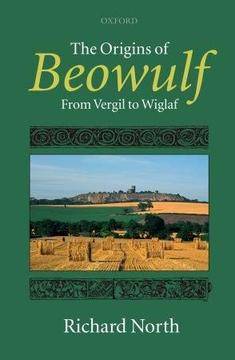 | 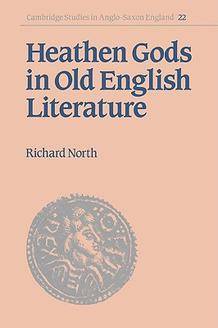 |
With Joe Allard (and Patricia Gillies) of the University of Essex, North edited and translated most of the Old English and Old Icelandic poetry and prose in the Longman Anthology of Old English, Old Icelandic and Anglo-Norman Literatures (2011): a reader to go with the much-loved ‘Beowulf’ & Other Stories which came out in 2007 (and again, in 2011).
The offerings in his vast Anthology include many sections from Beowulf and Andreas as well as the whole of Genesis B; The Dream of the Rood, The Wanderer, The Seafarer, Vainglory, some Old English Riddles, among other poems and prose; some poems in Old Welsh, Gaelic, Old High German and Castilian; some more in Occitan from the south of France as well as an extract from the Chanson de Roland; and from the Viking side, extracts from the Sagas of Icelanders, the great Sonatorrek ‘hard loss of sons’ of Egill Skalla-Grímsson (c. 960), the Vellekla ‘gold-shortage’ of Einarr skálaglamm ‘cup-tinkle’ Helgason and the Þórsdrápa ‘eulogy on Þórr’ of Eilílfr Goðrúnarson (c. 985).
North had already made separate editions and translations of the Haustlǫng ‘harvest-long’ of Þjóðólfr of Hvinir (c. 900) and the Húsdrápa ‘eulogy on the house’ of Úlfr Uggason (c. 995). He contends that Skaldic verse should be read not as the periodic table or glyphs on a Mayan stele, but as a kind of machote poetry like the lyrics of Rap.
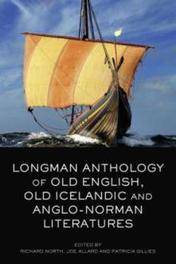 | 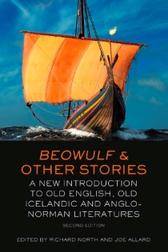 |
More recently, he has collaborated with Martin Worthington in a comparative study of Beowulf and Gilgamesh. With Mike Bintley he has published an edition, with parallel text and translation, of the Old English Andreas (a verse epic on St Andrew in the land of the cannibals).
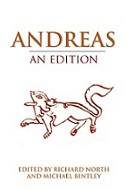 |
He sees a Cervantesque mockery of Beowulf within this poem, which he dates to c. 890; and he has also written on the Ynglingatal ‘list of the sons of Ingvi-freyr’ of Þjóðólfr of Hvinir, a parody, also datable to c. 890, of the old kings of Uppsala and their descendants living around Oslo.
Later medieval research interests
At the moment North is trying to prove the influence of Beowulf on The Saga of Grettir the Strong, to translate Loki: Beweger der Geschichten by Yvonne Bonnetain (Rudolstadt: Roter Drache, 2013), and to help create a new app of The Canterbury Tales (1390s). The last project, undertaken in concert with (i.a.) Terry Jones and Prof Peter Robinson of the University of Saskatchewan, promises to fill the rest of his life, but so far an app has been produced for The General Prologue in Fragment I: http://www.sd-editions.com/CantApp/GP/ .
Para-academic activity
For two years North acted as President of the London-based Viking Society for Northern Research, for which he has since been working as Hon. Assistant Secretary. For two more years North was Director of the UCL MARS Centre (i.e. Medieval and Renaissance Studies). In 2015 North and Vicky Symons helped advise on the content for software design in the project Playing Beowulf, a Digital Transformations project funded by the AHRC (https://medium.com/ucl-antenna/are-you-man-or-monster-d64d1dabe643#.adt1f2xhm). In July 2016 North and Erin Goeres of SELCS got a major AHRC award to stage ’The Siege of London 1016’, a conference in commemoration of Kings Æthelred II and Cnut the Great, in UCL and the University of Winchester.
Presently North is adviser on Medieval literature and history to his team (the Brockley Badgers) in the local pub quiz. What other impact his scholarship has made on the outside world, if not lost in the ephemera of BBC radio and independent TV (and lately German TV!), may be found in the short history of his stand-up appearances in UCL Bright Club. He has informed on paganism for the Vocabulary of the Study of Religions, lectured on the solar alignments of the old royal site in Yeavering, Northumberland, and written on Angelina Jolie for Time Out.
Publications
Books
1. Pagan Words and Christian Meanings, Costerus New Series 81 (Amsterdam and Atlanta, GA: Rodopi, 1991), 198 pp. ISBN 90 5183 305 9
2. The ‘Haustlǫng’ of Þjóðólfr of Hvinir, edited, with introduction, translation, commentary and glossary (London: Hisarlik Press, 1997), lxvii and 105 pp. ISBN 1 874312 20 6
3. Heathen Gods in Old English Literature, Cambridge Studies in Anglo-Saxon England 22 (Cambridge: Cambridge University Press, 1997), x and 374 pp. ISBN 0 521 55183 8
4. The Origins of ‘Beowulf’: From Vergil to Wiglaf (Oxford: Oxford University Press, 2006), xviii and 365 pp., 6 Illustrations, 10 Figures, ISBN 0-19-926776-6
5. The Longman Anthology of Old English, Old Icelandic and Anglo-Norman Literatures, Richard North, Joe Allard, and Patricia Gillies (London: Pearson Education Ltd, 2011), 888 pp. ISBN 978-1-4082-4770-9
6. Andreas: An Edition, edited, with introduction, translation, commentary and glossary by Richard North and Michael D. J. Bintley, Exeter Medieval Texts and Studies (Liverpool: Liverpool University Press, 2016), xiv and 378 pp. ISBN 978-1-78138-271-4
Edited Books
1. Latin Culture and Germanic Europe: Proceedings of the First Germania Latina Conference, ed. Richard North and Tette Hofstra, Germania Latina I (Groningen: Egbert Forsten, 1992), 128 pp. ISBN 90 0980 059 7
2. Fótarkefli rist Peter Foote 26.v.99 [birthday Festschrift], ed. Alison Finlay, Richard North and Svanhildur Óskarsdóttir, 2 vols. (London: Birkbeck Press, 1999), 55 and 33 pp.
3. ‘Beowulf’ & Other Stories: A New Introduction to Old English, Old Icelandic, and Anglo-Norman Literatures, ed. Richard North and Joe Allard (London: Pearson Education Ltd, 2007), c. 500 pp., 15 Illustrations. ISBN 1405835729
4. ‘Beowulf’ & Other Stories: A New Introduction to Old English, Old Icelandic, and Anglo-Norman Literatures, 2nd edition, ed. Richard North and Joe Allard (London: Pearson Education Ltd, 2011), 556 pp., 29 illustrations, one new chapter. ISBN 978-1-4082-8603-6
Articles and Chapters
1. ‘Jeux d’esprit in “Deor”‘: Geat and Mæðhild’, Amsterdamer Beiträge zur älteren Germanistik 27 (1988), 11-24
2. ‘Kening Finn en it ferdrach fan Finnsboarch yn de Beowulf’, Us Wurk 38 (1989), 1-11
3. ‘Tribal Loyalties in the Finnsburh Fragment and Episode’, Leeds Studies in English New Series 21 (1990), 13-43
4. ‘The Pagan Inheritance of Egill’s Sonatorrek’, Atti del 12. Congresso internazionale di Studi sull’alto Medioevo, ed. Teresa Pàroli (Rome: Il Calamo, 1991), pp. 147-67
5. ‘Getting to Know the General in The Battle of Maldon’, Medium Ævum 60 (1991), 1-15
6. ‘Saxo and the Swedish Wars in Beowulf’, in Saxo Grammaticus. Tra Storiografia e Letteratura, ed. Carlo Santini (Rome: Il Calamo, 1992), pp. 175-88
7. ‘King Æthelwulf and the Goths in “Deor”‘, Amsterdamer Beiträge zur älteren Germanistik 40 (1994), 7-20
8. ‘“Wyrd” and “wearð ealuscerwen” in Beowulf’, Leeds Studies in English New Series 25 (1994), 69-82
9. ‘Metre and Meaning in Wulf and Eadwacer: Signý Reconsidered’, in Loyal Letters: Studies in Mediaeval Alliterative Poetry and Prose, ed. L. A. J. Houwen and A. A. MacDonald (Groningen: Egbert Forsten, 1994), pp. 29-54
10. ‘Boethius and the Mercenary in The Wanderer’, Pagan and Christian Themes in Medieval Germanic Literature: Proceedings of the Second Germania Latina Conference, ed. L. A. J. R. Houwen and A. A. MacDonald, Germania Latina 2 (Groningen: Egbert Forsten, 1995), pp. 45-68
11. ‘Óðinn gegen Freyr: Elemente heidnischer Religion in der Víga-Glúms Saga’, in International Scandinavian and Medieval Studies in Memory of Gerd Wolfgang Weber, ed. M. Dallapiazza, O. Hansen, P. Meulengracht Sørensen and Y. S. Bonnetain, Hesperides: Studies in Western Literature and Civilization 12 (Trieste: Edizioni Parnaso, 2000), 347-365
12. ‘Anglo-Saxon and Scandinavian Attitudes to 999/1000’, in Fins de Siècle / New Beginnings, ed. Ib Johansen, The Dolphin 31 (Aarhus: Aarhus University Press, 2000), 17-38
13. ‘Goð geyja: the Limits of Humour in Old Norse-Icelandic Paganism’, Quaestio Insularis: Selected Proceedings of the Cambridge Colloquium in Anglo-Saxon, Norse and Celtic, 1 (2000), 1-22
14. ‘Loki’s Gender, or Why Skaði Laughed’, in Monsters and the Monstrous in Medieval Northwest Europe, ed. K. E. Olsen and L. A. J. R. Houwen, Mediaevalia Groningana, New Series 3 (Louvain, 2001), 141-51
15. ‘Paganism, Anglo-Saxon’, in The Encyclopedia of Religion, ed. L. Jones, Macmillan Reference series (New York: Macmillan Reference, 2005), s.v.
16. ‘Money and Religion in Færeyinga saga’, in Viking and Norse in the North Atlantic: Select Papers from the Proceedings of the Fourteenth Viking Congress, Tórshavn, 19-30 July 2001, ed. A. Mortensen and S. V. Arge, Annales Societatis Scientiarum Færoensis, Supplementum XLIV (Tórshavn, 2005), 60-75
17. ‘Image and Ascendancy in Úlfr’s Húsdrápa’, Image, Word, Text: Studies in Anglo-Saxon Literature and its Insular Context in Honour of Éamonn Ó Carragáin, ed. Alastair Minnis and Jane Roberts, Studies in the Early Middle Ages, 18 (Turnhout, 2006), 369-404
18. ‘End Time and the date of Vǫluspá: Two Models of Conversion’, in Conversion and Colonization in Anglo-Saxon England, ed. Catherine E. Karkov and Nicholas Howe, Medieval and Renaissance Texts and Studies, 318 (Tempe, AZ: University of Arizona Press, 2006), 213-236
19. ‘An Introduction to this Book’, by Richard North, David Crystal and Joe Allard (2007)
20. ‘Old English Minor Heroic Verse’, in above
21. ‘The Dream of the Rood and Anglo-Saxon Northumbria’, by Éamonn Ó Carragáin and Richard North, in above
22. ‘OE scop and the Singing Welsh Bishop’, in Northern Voices: Essays on Old Germanic and Related Topics offered to Professor Tette Hofstra, ed. Kees Dekker, Alasdair MacDonald and Hermann Niebaum, Germania Latina VI, Mediaevalia Groningana, N.S. 11 (Leuven: Peeters, 2008), 199-122
23. ‘Sighvatr Sturluson and the authorship of Viga-Glums saga’, in Analecta Septentrionalia. Beiträge zur nordgermanischen Kultur- und Literaturgeschichte. Festschrift an Kurt Schier, ed. Wilhelm Heizmann and Astrid van Nahl, Ergänzungsbände zum Reallexikon der Germanischen Altertumskunde (Berlin: Walter de Gruyter, March 2009), pp. 20-36.
24. ‘Revenue and Real estate: Archbishop Wulfred and the Strange Case of Cynehelm’, in Anglo-Saxon Traces, ed. Jane Roberts and Leslie Webster, Essays in Anglo-Saxon Studies 4, Medieval and Renaissance Texts and Studies, 405 (Tempe, AZ, 2011), 181-99
25. ‘OE wopes hring and the Old Norse Myth of Baldr’, in Early Archaeology and Art in the British Isles: Studies in Honour of James Graham-Campbell, ed. Andrew Reynolds and Leslie Webster (Leiden: Brill, 2012), pp. 893-910
26. North, Richard and Martin Worthington, ‘Gilgamesh and Beowulf: Foundations of a Comparison’, in Decoding Gilgamesh, ed. Martin Worthington, KASKAL: Rivista di Storia, Ambienti e Culture del Vicino Oriente Antico, 9 (Florence, 2012), 157-97
27. ‘Kurzweilige Wahrheiten: ‘Ari und das Ynglingatal in den Prologen der Heimskringla’, in Snorri Sturluson – Mythologe, Dichter, Politiker, ed. Heinrich Beck, Willhelm Heizmann and Jan Alexander van Nahl, Ergänzungsbände zum Reallexikon der Germanischen Altertumskunde, 85 (Berlin: Walter de Gruyter, 2014), 171-216
28. ‘MLA or MIA? Thoughts on Modernity in the Medieval Novel’, in News from the Raven: Essays from Sam Houston State University on Medieval and Renaissance Thought, ed. Darci N. Hill (Newcastle upon Tyne, 2014), pp. 2-36
29. ‘Morgan le Fay and the Fairy Mound in Sir Gawain and the Green Knight’, in Airy Nothings: Imagining the Otherworld of Faerie from the Middle Ages to the Age of Reason: Essays in Honour of Alasdair A. MacDonald, ed. Karin E. Olsen and Jan R. Veenstra (Leiden and Boston, MA: Brill, 2014), pp. 75-98
30. ‘From Pandaro to Pandarus: Sexuality and Power in Chaucer’s Troilus and Criseyde’, in Boccaccio and the European Literary Tradition, ed. Piero Boitani and Emilia Di Rocco, Temi e Testi, 134 (Rome: Edizioni di Storia e Letteratura, 2014), 123-38
31. ‘You Sexy Beast: the Pig in a Villa in Vandalic North Africa, and Boar-Cults in Old Germanic Heathendom’, in Representing Beasts in Early Medieval England and Scandinavia, ed. Michael D. J. Bintley and Thomas J. T. Williams, Anglo-Saxon Studies 29 (Woodbridge: Boydell, 2015), 151-75
32. ‘Paganism’, in Vocabulary for the Study of Religion, ed. Robert A. Segal and Kocku von Stuckrad, 3 vols. (Leiden: Brill, 2015) III, 3-9
33. ‘Heaven ahoy! Sensory perception in The Seafarer’, in Sensory Perception in the Medieval West, ed. Simon Thomson and Michael J. Bintley, Utrecht Studies in Medieval Literacy 34 (Turnhout, 2016), 7-26
34. ‘Sleeping dogs and stasis in The Franklin’s Tale’, in Stasis in the Medieval West? Questioning Change and Continuity, ed. Michael D.J. Bintley, Martin Locker, Victoria Symons and Mary Wellesley (New York: Palgrave Macmillan, 2017), pp. 205-30
35. ‘Meet the Pagans: On the Misuse of Beowulf in Andreas’, in Aspects of Knowledge: Preserving and Reinventing Traditions of Learning in the Middle Ages, ed. Marilina Cesario and Hugh Magennis (Manchester: Manchester University Press, 2018), pp. 185-209
36. ‘Hrothulf’s childhood and Beowulf’s: a comparison’, in Childhood and Adolescence in Anglo-Saxon Literary Culture, ed. Susan Irvine and Winfried Rudolf (Toronto: Toronto University Press, 2018), pp. 222-43
37. ‘Gold and the heathen polity in Beowulf’, in Gold in der europäischen Heldensage, ed. Heike Sahm, Wilhelm Heizmann und Victor Millet, Ergänzungsbände zum Reallexikon der Germanischen Altertumskunde, 109 (Berlin and Boston, MA: Water de Gruyter, 2019), 72-114.
38. ‘Death ere the Afternoon: Jómsvíkinga saga and a Scene in Hemingway’s For Whom the Bell Tolls’, in The Vikings Reimagined: Reception, Recovery, Engagement, ed. Tom Birkett and Roderick Dale, The Northern Medieval World: On the Margins of Europe (Berlin and Boston, MA: Walter de Gruyter, 2020), pp. 145-161.
39.’Der Teufel im sächsischen Garten: Loki und eine Jenseitsreise in der altsächsisch-altenglischen Genesis B’, in Between the Worlds: Contexts, Analogues and Sources of Scandinavian Otherworld Journeys, ed. Wilhelm Heizmann and Matthias Egeler (Berlin and Boston, MA: Walter de Gruyter, 2020), pp. 79-117.
40. ‘Lady Æthelflæd and the Danelaw in the West Saxon Judith’, Poetica 93 [and 94] (2020), 29-48.
41. ‘“In hethenesse”: Chaucer’s Knight and Sultan Muḥammad V of Granada’, in Of ye Olde Englisch Langage and Textes: New Perspectives on Old and Middle English Language and Literature, ed. Rodrigo Pérez Lorido, Carlos Prado Alonso and Paula Rodríguez-Puente, Studies in English Medieval Language and Literature (Berlin: Peter Lang, 2020), pp. 301-321.
42. with Peter Robinson, Barbara Bordalejo, Claire Pascolin-Campbell and Vicky Symons, Geoffrey Chaucer: CantApp: The General Prologue: An Edition in an App (2020): http://www.sd-editions.com/CantApp/GP/
43. [Forthcoming] ‘Resident Stranger: Sæmundr in the Ashkenaz’, in Strangers at the Gate: The (Un)welcome Movement of People and Ideas in the Medieval World, ed. Simon C. Thomson, Explorations in Medieval Culture (Leiden: Brill)
44. [Forthcoming] ‘Behold the Front Page: Cnut and the Scyldings in Beowulf’, in Anglo-Danish Empire: A Companion to the Reign of King Cnut the Great, ed. Richard North, Alison Finlay and Erin Goeres [see above]
45. [Forthcoming] ‘Iceland’s Alexander: Gunnarr and pale corn in Njáls saga’, in Medieval Stories and Storytelling: Multimedia and Multi-Temporal Perspectives, to be published by Brepols, in a new series called “Medieval Narratives in Transmission: Cultural and Medial Translation of Vernacular Traditions”, ed. Simon Thomson
46. [Forthcoming] ‘Radegund and Amalfrid in The Wife's Lament’, in The Lifespan of Medieval English Literature, 900-1550: Discontinuity and Renewal, ed. Anun Carrera de la Red
47. [Forthcoming] ‘King John's Envoy: Chaucer and Performance in The Book of the Duchess’, in The Lifespan of Medieval English Literature, 900-1550: Discontinuity and Renewal, ed. Anun Carrera de la Red
48. [Forthcoming] ‘Eostre the “goddess” and the free-standing posts of Yeavering’, in Starcræft: Watching the Heavens in the Early Middle Ages, ed. Eric Lacey and Martin Locker (Amsterdam University Press)
Translated Books
1. The First Universities: Studium Generale and the Origins of University Education in Europe, by Olaf Pedersen (Cambridge: Cambridge University Press, 1997) [orig. Studium Generale: De europæiske universiteters tilblivelse (Copenhagen: Gyldendal, 1979), 338 pp.] ISBN 0 521 59431 6
Other publications
1. ‘The Pagan Inheritance of Egill’s Sonatorrek’, in ‘Poetry in the Scandinavian Middle Ages’, VII International Saga Conference, Preprints, 4-10 September, 1988 Centro Italiano di Studi sull’ Alto Medioevo, Spoleto), pp. 289-300
2. ‘How was Hávamál performed?’, in ‘The Audience of the Sagas’, VIII International Saga Conference, Preprints, 11-17 August, 1991 (Gothenburg University)
3. ‘Heathen religion in Haustlöng’, in ‘Sagas and the Norwegian Experience’, X International Saga Conference, Preprints, 3-9 August, 1997 (Trondheim University), pp. 511-20
4. ‘Fótardrápa’ [20-stanza Skaldic poem in honour of Peter Foote], in Fótarkefli rist Peter Foote 26.v.99, ed. Alison Finlay, Richard North and Svanhildur Óskarsdóttir, 2 vols. (London: Birkbeck Press, 1999) I, 30-32
Some reviews
1. On Ursula Dronke, ed., The Poetic Edda, Volume 2, in Saga-Book of the Viking Society 25 (1999), 219-26
2. On Magnús Fjalldal, The Long Arm of Coincidence: the Frustrated Connection between Beowulf and Grettis Saga, in Envoi 8 (1999), 52-8
3. On Klaus von See, Europa und der Norden im Mittelalter, in Saga-Book of the Viking Society 26 (2002), 139-42
4. Richard North on Beowulf in Time Out
 Close
Close

